On Tuesday night, the minister shared on Facebook a response by Darius Kuliesius, the presidential national security adviser, to his ministry's earlier call to hold a SDC meeting, with the document stating that "supporting material and arguments" were needed to hold a meeting of the state and national defense leaders.
"Specific procedural documents related to the ongoing procurement are not a basis for the SDC agenda," the SDC secretary stated in the response to Veryga.
Meanwhile, Veryga says Kuliesius did not even get acquainted with the provided documents "as he refused to sign the European Commission's standard confidentiality declaration and did not get the key to open those documents".
According to the minister, Lithuania needs to decide this week on the allocation of additional funds to the vaccine support fund, and also "to decide as fast as possible on a vaccine procurement strategy".
"We believe Lithuania must urgently make decisions regarding the procurement of a coronavirus vaccine, which is directly related to the possibility to effectively manage the health threat posed by this virus to people's health and lives, and also to avoid serious negative consequences that could potentially involve all areas of the state's life," Veryga said.
The minister also says such decisions are also related to the state's commitments and potential risks involving the diversification of supply and timely acquisition of a vaccine. Veryga also underlined that the SDC had numerous times discussed procurements of the national defense system, energy and transport issues, therefore, the procurement of a vaccine "is definitely as important as potential railway projects".
"Following the adviser's refusal to accept information today, it remains unclear how one could expect institutional cooperation on this important matter," he said.
Last week, the Lithuanian government decided to turn to the SDC for it to make a decision on joint procurement of coronavirus vaccines by Lithuania and other EU states as doubts arose on risks to be accepted and on the reputation of the vaccine creators.
Prime Minister Saulius Skvernelis underlined then that the information provided by the special services about AstraZeneca, a pharmaceutical company creating a coronavirus vaccine, is controversial as the company was suspected of possible bribery in one state during a certain period. Also, during another period, the company was selling medications that were not effective.
Also last week, AstraZeneca halted its clinical trials of its COVID-19 vaccine as one of the volunteers developed unexplained symptoms.
